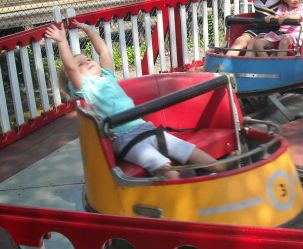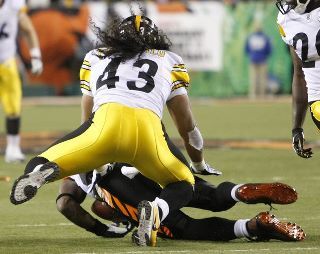Post by misty on Jul 21, 2007 21:50:33 GMT -5
I signed up awhile back for these free lessons on bipolar children. I forgot all about it until they started appearing in my email. Dont ask me for the link, because I have no idea where I first signed up. I am going to post them here as they come though so that anyone who's interested can see.
How do you know if your child has Bipolar disorder?
Well, the truth is that this is a real problem, and that is one
of the reasons so many doctors miss this diagnosis.
We know what bipolar disorder looks like in adults. But there
has been so little research on bipolar disorder in children that
there are no good diagnostic criteria for children. What most
doctors do is to take the adult criteria and apply them to
children.
And that is a mistake because…
It is becoming more and more clear the symptoms of bipolar
disorder in children are not the same as adults.
So what I am going to do now is to tell you the 'classic'
symptoms of bipolar disorder in adults and tell you where your
child may be different.
So let's start with the manic episodes…
I. An adult meets the criteria of having a manic episode if the
following are true:
1. He has an abnormally elevated, expansive, or irritable mood,
lasting at least 1 week, which:
a. Impairs in his ability to function normally, or
b. Requires hospitalization to prevent harm to himself or
others, or
c. Is accompanied by psychotic symptoms
2. These symptoms are not due to the effects of a substance use
or a general medical condition.
3. During this period at least 3 of the following symptoms must
be present:
a. Inflated self-esteem or grandiosity
b. Decreased need for sleep
c. Excessive talking
d. Flight of ideas or subjective experience that thoughts are
racing
e. Distractibility
f. Increased goal-directed activity or psychomotor agitation
g. Excessive involvement in pleasurable activities that may lead
to painful consequences
II. To earn a diagnosis of bipolar depression an adult must show
five of the following symptoms: These symptoms have to be present
nearly every day during the same 2-week period; at least one of
the symptoms is either depressed mood or loss of interest or
pleasure.
1. Depressed mood most of the day
2. Markedly diminished interest or pleasure or daily activities
for most of the day
3. Significant change in weight or appetite
4. Insomnia
5. Motor agitation or retardation observable by others
6. Fatigue or loss of energy
7. Feelings of worthlessness or excessive or inappropriate guilt
8. Diminished ability to think or concentrate or indecisiveness
9. Recurrent thoughts of death, or thoughts or plans about
suicide
These symptoms cause significant impairment in functioning, and
cannot be accounted for by some precipitating event, medical
condition or medication use.
III. An adult meets the criteria for mixed bipolar disorder the
patient has to meet the following criteria:
1. Meet the criteria for a manic episode and for a major
depressive episode nearly every day for a 1-week period.
2. Have mood disturbance that impair function, necessitate
hospitalization, or have psychotic features.
3. Have symptoms that cannot be attributed to the use of
medication or any medical condition.
If your child meets these criteria, a competent physician should
diagnose him as having bipolar disorder.
But here is the problem….
Children and teens do not always follow this pattern!
In children the symptoms are different. Manic children and
adolescents are more likely to be irritable and prone to
destructive outbursts than to be elated or euphoric.
Depressed children often have physical complaints, such as
headaches, muscle aches, stomachaches or tiredness. Their school
performance drops and they are frequently absent from school.
These children are often irritable, cry unexpectedly and are
extremely sensitivity to rejection or failure.
There is another phenomenon in children with bipolar disorder
that does not occur commonly in adults.
Adults with bipolar disorder can go back and forth between
depression and manic episodes, but each episode can last several
days or weeks.
In children that is not always the case.
Children bounce back and forth between extremes at a much
quicker pace. Some children can go from the highs of mania to
the lows of depression and each episode can last only a few
minutes. In fact one psychologist told me that he once
witnessed a bipolar child display all the signs of mania during
at the same time he was having an episode of depression!
Now something like this is not described anywhere in the medical
literature. If your doctor sees this or you describe it to him,
he is not going to know what to make of it.
As we have discussed previously, undiagnosed bipolar disorder
can be dangerous or even fatal. And just because we can't
always tell that your child has bipolar disorder, it doesn't
make the condition any less dangerous.
You as a parent still MUST know if your child has bipolar
disorder or not. The important thing to remember is that just
because your doctor says that your child does not have bipolar
disorder it doesn't mean that he is correct.
The bottom line is that if you feel your child has bipolar
disorder you must be persistent.
In our next lesson we are going to discuss another factor that
makes if even harder to tell if your child has bipolar
disorder.
Warmly,
Anthony Kane, MD
How do you know if your child has Bipolar disorder?
Well, the truth is that this is a real problem, and that is one
of the reasons so many doctors miss this diagnosis.
We know what bipolar disorder looks like in adults. But there
has been so little research on bipolar disorder in children that
there are no good diagnostic criteria for children. What most
doctors do is to take the adult criteria and apply them to
children.
And that is a mistake because…
It is becoming more and more clear the symptoms of bipolar
disorder in children are not the same as adults.
So what I am going to do now is to tell you the 'classic'
symptoms of bipolar disorder in adults and tell you where your
child may be different.
So let's start with the manic episodes…
I. An adult meets the criteria of having a manic episode if the
following are true:
1. He has an abnormally elevated, expansive, or irritable mood,
lasting at least 1 week, which:
a. Impairs in his ability to function normally, or
b. Requires hospitalization to prevent harm to himself or
others, or
c. Is accompanied by psychotic symptoms
2. These symptoms are not due to the effects of a substance use
or a general medical condition.
3. During this period at least 3 of the following symptoms must
be present:
a. Inflated self-esteem or grandiosity
b. Decreased need for sleep
c. Excessive talking
d. Flight of ideas or subjective experience that thoughts are
racing
e. Distractibility
f. Increased goal-directed activity or psychomotor agitation
g. Excessive involvement in pleasurable activities that may lead
to painful consequences
II. To earn a diagnosis of bipolar depression an adult must show
five of the following symptoms: These symptoms have to be present
nearly every day during the same 2-week period; at least one of
the symptoms is either depressed mood or loss of interest or
pleasure.
1. Depressed mood most of the day
2. Markedly diminished interest or pleasure or daily activities
for most of the day
3. Significant change in weight or appetite
4. Insomnia
5. Motor agitation or retardation observable by others
6. Fatigue or loss of energy
7. Feelings of worthlessness or excessive or inappropriate guilt
8. Diminished ability to think or concentrate or indecisiveness
9. Recurrent thoughts of death, or thoughts or plans about
suicide
These symptoms cause significant impairment in functioning, and
cannot be accounted for by some precipitating event, medical
condition or medication use.
III. An adult meets the criteria for mixed bipolar disorder the
patient has to meet the following criteria:
1. Meet the criteria for a manic episode and for a major
depressive episode nearly every day for a 1-week period.
2. Have mood disturbance that impair function, necessitate
hospitalization, or have psychotic features.
3. Have symptoms that cannot be attributed to the use of
medication or any medical condition.
If your child meets these criteria, a competent physician should
diagnose him as having bipolar disorder.
But here is the problem….
Children and teens do not always follow this pattern!
In children the symptoms are different. Manic children and
adolescents are more likely to be irritable and prone to
destructive outbursts than to be elated or euphoric.
Depressed children often have physical complaints, such as
headaches, muscle aches, stomachaches or tiredness. Their school
performance drops and they are frequently absent from school.
These children are often irritable, cry unexpectedly and are
extremely sensitivity to rejection or failure.
There is another phenomenon in children with bipolar disorder
that does not occur commonly in adults.
Adults with bipolar disorder can go back and forth between
depression and manic episodes, but each episode can last several
days or weeks.
In children that is not always the case.
Children bounce back and forth between extremes at a much
quicker pace. Some children can go from the highs of mania to
the lows of depression and each episode can last only a few
minutes. In fact one psychologist told me that he once
witnessed a bipolar child display all the signs of mania during
at the same time he was having an episode of depression!
Now something like this is not described anywhere in the medical
literature. If your doctor sees this or you describe it to him,
he is not going to know what to make of it.
As we have discussed previously, undiagnosed bipolar disorder
can be dangerous or even fatal. And just because we can't
always tell that your child has bipolar disorder, it doesn't
make the condition any less dangerous.
You as a parent still MUST know if your child has bipolar
disorder or not. The important thing to remember is that just
because your doctor says that your child does not have bipolar
disorder it doesn't mean that he is correct.
The bottom line is that if you feel your child has bipolar
disorder you must be persistent.
In our next lesson we are going to discuss another factor that
makes if even harder to tell if your child has bipolar
disorder.
Warmly,
Anthony Kane, MD











